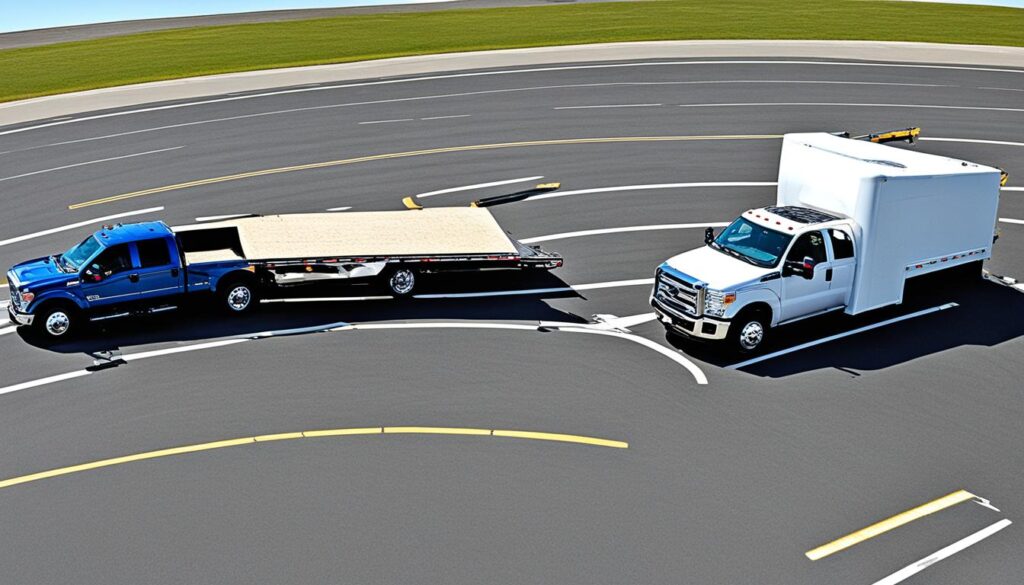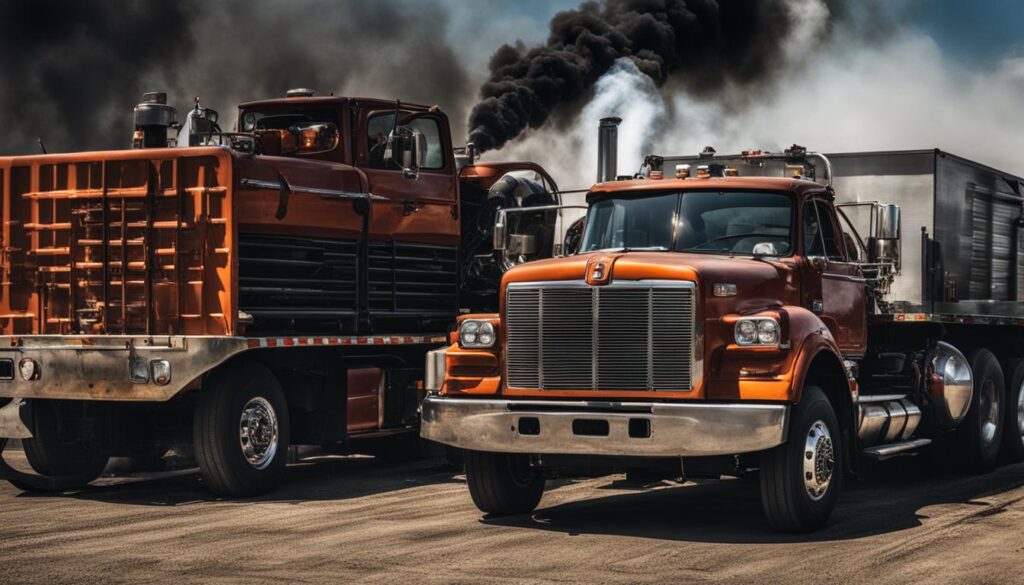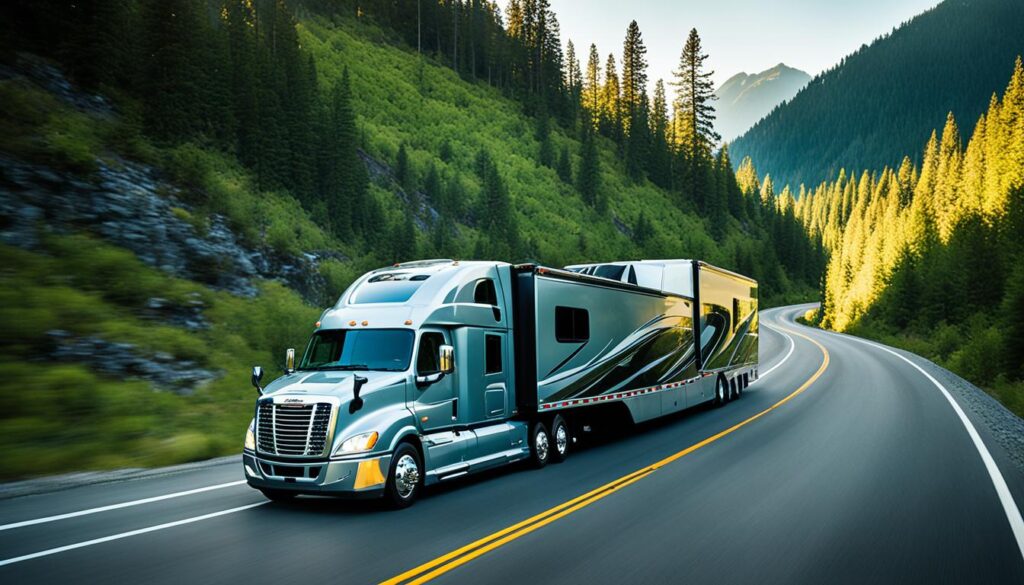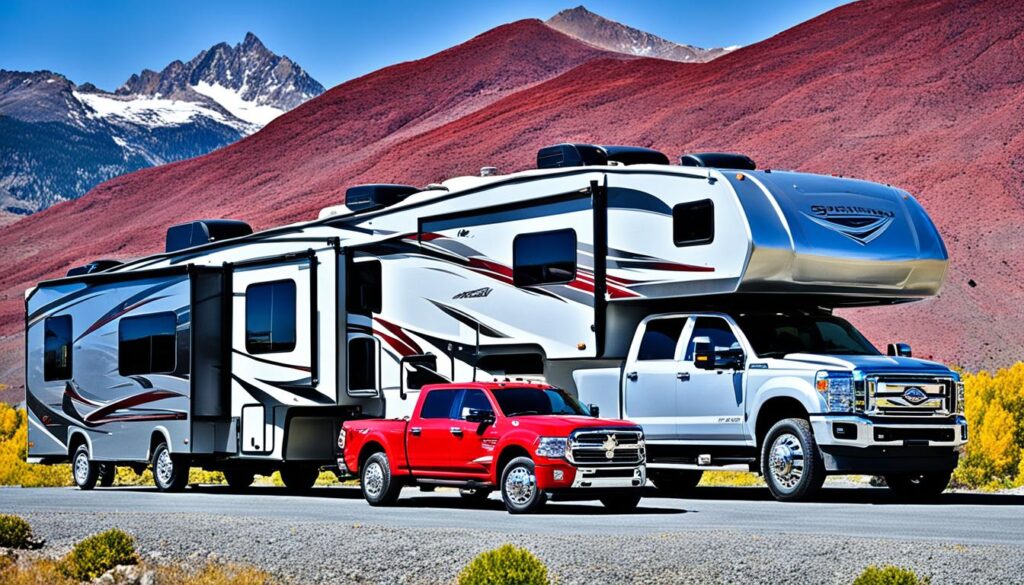Selecting a truck to pull a Fifth Wheel RV can be a daunting task. With so many factors to consider, such as towing capacity, truck bed size, and engine type, it’s important to make an informed decision. But one question that often comes up is: What size truck do you really need to pull a Fifth Wheel?
Believe it or not, the answer may surprise you. It’s not just about the size of the truck, but also about its towing capacity, payload capacity, and the weight distribution of the Fifth Wheel. In this article, I will provide you with all the important information you need to choose the right truck for your Fifth Wheel RV. Let’s dive in!
Key Takeaways:
- Choosing the right truck to pull a Fifth Wheel RV is crucial for a safe and smooth towing experience.
- Consider factors such as towing capacity, payload capacity, and weight distribution when selecting a truck.
- A long bed truck is generally recommended for towing a Fifth Wheel RV to ensure proper turning radius and additional storage space.
- Diesel engines are often preferred for towing due to their low-end torque and better mileage.
- Upgrading truck tires with a higher load rating can increase the payload capacity.
Contents
Long Bed versus Short Bed Truck
When it comes to towing a Fifth Wheel RV, choosing the right truck bed size is crucial. Two common options are the long bed truck and the short bed truck. Let’s take a closer look at the differences between these two options and which one may be more suitable for your needs.
The Turning Radius Factor
One significant factor to consider is the turning radius of the truck. Short bed trucks typically have a smaller turning radius compared to long bed trucks, which means they can make tighter turns. However, this can become a disadvantage when towing a Fifth Wheel RV.
“The decreased turning radius of a short bed truck can cause the front of the Fifth Wheel to hit the truck’s cab.”
When making sharp turns, the front of the Fifth Wheel may come in contact with the truck’s cab, leading to potential damage and safety concerns. This issue can be mitigated when using a long bed truck due to the extended distance between the trailer and the truck’s cab.
Storage Space Considerations
Another aspect to keep in mind is the available storage space in the truck bed. Long bed trucks provide more room in the bed, allowing you to carry additional gear and equipment. Whether it’s camping gear, tools, or other essentials, having that extra storage space can be highly beneficial during your journeys.
On the other hand, short bed trucks have a reduced bed length, which limits the storage area. This can pose challenges when needing to pack bulky or larger items as space may be insufficient. If you value ample storage space, a long bed truck would be a more suitable choice.
Choose Wisely
Ultimately, the decision between a long bed and a short bed truck hinges on your specific towing needs and preferences. Consider factors such as maneuverability, storage requirements, and the size of the Fifth Wheel RV you plan to tow. It’s crucial to assess these aspects carefully to make an informed choice that will enhance your towing experience.

| Long Bed Truck | Short Bed Truck | |
|---|---|---|
| Turning Radius | Larger turning radius | Smaller turning radius |
| Storage Space | More storage space in the bed | Limited storage space |
| Benefits | – Decreased risk of trailer-truck collision during turns – Ample storage for gear and equipment | – Improved maneuverability – Suitable for smaller Fifth Wheel RVs |
| Considerations | – May be less maneuverable – Longer overall vehicle length | – Limited bed space for larger items – Potential trailer-truck collision risk |
Diesel versus Gas Engine
When it comes to towing Fifth Wheel RVs, the choice between a diesel engine and a gas engine is an important consideration. Let’s explore the key differences to help you make an informed decision.
Low-End Torque for Easy Towing
An advantage of diesel engines is their low-end torque, which provides exceptional pulling power. This torque allows diesel trucks to effortlessly handle the heavy load of a Fifth Wheel RV, making towing more manageable and less straining on the engine. Gas engines, while capable of towing, may have a harder time providing the same level of torque as diesel engines.
Improved Mileage and Longer Lifespan
Another benefit of diesel engines is their superior mileage compared to gas engines. This efficiency translates to cost savings in the long run, especially during extended trips. Diesel trucks can travel longer distances on a single tank of fuel, reducing the need for frequent refueling stops.
Furthermore, diesel engines are known for their durability and longer lifespan, especially when used for towing. They are built to handle the extra strain and stress that comes with towing heavy loads, ensuring reliability and longevity.
Suitability for Smaller Fifth Wheels
While diesel engines are often preferred for towing larger Fifth Wheel RVs, it’s worth noting that gas engines can still be suitable for towing smaller Fifth Wheels. If you have a lightweight Fifth Wheel with a lower towing capacity, a gas engine can provide sufficient power for your towing needs.

Overall, diesel engines are the preferred choice for towing Fifth Wheel RVs due to their low-end torque, better mileage, and longer lifespan. However, gas engines can still be a viable option for towing smaller Fifth Wheels. Consider your specific towing requirements and preferences before making your decision.
What is the Best Truck To Pull a Fifth Wheel RV
Choosing the best truck to pull a Fifth Wheel RV requires careful consideration of various factors such as towing capacity and payload capacity. While our data shows that Ford trucks are popular among Fifth Wheel owners due to their high towing and payload capacities, there are other truck brands and sizes that can also effectively handle towing Fifth Wheels.
When it comes to towing capacity, Ford trucks offer impressive numbers that make them a top choice. However, it’s essential to evaluate your specific towing needs and the weight of your Fifth Wheel RV to ensure that you select the best truck for your requirements.
Other truck brands such as Chevrolet, Ram, and GMC also offer a range of models with excellent towing capabilities. It’s crucial to compare their towing and payload capacities to find the truck that best suits your needs.
Consideration of different truck sizes is also essential when choosing the best truck for towing a Fifth Wheel RV. Larger trucks with higher payload capacities may be preferred for towing larger Fifth Wheels, while smaller trucks can handle smaller Fifth Wheel RVs efficiently.
<!–
Comparing Towing Capacity by Truck Brands:
–>
| Truck Brand | Towing Capacity (lbs) |
|---|---|
| Ford | 14,000 – 37,000 |
| Chevrolet | 13,000 – 36,000 |
| Ram | 14,000 – 35,100 |
| GMC | 14,000 – 35,500 |
As seen in the table above, Ford, Chevrolet, Ram, and GMC trucks offer a wide range of towing capacities to accommodate different Fifth Wheel RVs. It is essential to match your RV’s weight with a truck that can safely handle the load, ensuring a comfortable and secure towing experience.
When considering the best truck to pull a Fifth Wheel RV, it is important to evaluate not only towing capacity but also payload capacity. The payload capacity determines how much weight the truck can carry in terms of passengers, cargo, and the weight applied by the Fifth Wheel’s pin weight.
<!–
Comparing Payload Capacity by Truck Sizes:
–>
| Truck Size | Payload Capacity (lbs) |
|---|---|
| Mid-Size | 1,000 – 2,500 |
| Full-Size | 2,000 – 4,000 |
| Heavy-Duty | 3,000 – 5,500 |
The table above highlights the payload capacity range for different truck sizes. Depending on the weight of your Fifth Wheel RV and additional cargo, you can select a truck size with an appropriate payload capacity to ensure optimal performance and safety during towing.
<!–
Key Considerations for Choosing the Best Truck:
–>
- Evaluate towing capacity and payload capacity.
- Consider the weight of your Fifth Wheel RV.
- Compare truck brands such as Ford, Chevrolet, Ram, and GMC.
- Assess the towing capabilities of different truck sizes.
- Consult with experts or dealerships for personalized recommendations.
Choosing the best truck to pull a Fifth Wheel RV involves a careful analysis of towing and payload capacities, as well as considering the weight of your RV and the specific features offered by different truck brands and sizes. By taking these factors into account, you can confidently select a truck that will provide a reliable and enjoyable towing experience for your Fifth Wheel adventures.
What Size Truck do I need to pull a Fifth Wheel
When it comes to towing a Fifth Wheel, choosing the right size truck is crucial. To ensure a safe and efficient towing experience, several factors need to be considered. These include the maximum loaded weight and pin weight of the Fifth Wheel, as well as the towing capacity and payload capacity of the truck.
The maximum loaded weight refers to the total weight of the Fifth Wheel when it is fully loaded with all your belongings. It includes the weight of the RV itself and all the items you plan to carry during your trips. It is essential not to exceed the maximum loaded weight as doing so can put unnecessary strain on the truck and compromise its towing capabilities.
The pin weight, on the other hand, is the amount of weight that rests on the hitch point between the Fifth Wheel and the truck. It plays a significant role in determining the truck’s payload capacity. The payload capacity refers to the maximum amount of weight that the truck can safely carry, including passengers, cargo, and the pin weight of the Fifth Wheel.
To select the right truck size, you need to ensure that the truck’s towing capacity is sufficient to handle the Fifth Wheel’s weight. The towing capacity refers to the maximum weight that the truck can tow. It is crucial not to exceed this limit to avoid compromising the truck’s safety and performance while towing.
Additionally, the truck’s payload capacity should be able to accommodate the Fifth Wheel’s pin weight as well as any additional passengers and cargo you plan to bring along on your trips. Exceeding the payload capacity can lead to excessive strain on the truck’s suspension and brakes, posing safety risks.
Truck Size Considerations
When determining the appropriate truck size for towing a Fifth Wheel, it is advisable to consult the specific manufacturer’s guidelines and recommendations. They provide the towing and payload capacities for their vehicles, helping you make an informed decision.
Using a truck with a payload capacity that matches or exceeds the Fifth Wheel’s pin weight ensures a stable and secure towing experience. It also allows for a more comfortable ride and better control over the entire rig.
Here is an example of a table comparing the towing and payload capacities of different truck models:
| Truck Model | Towing Capacity | Payload Capacity |
|---|---|---|
| Ford F-150 | 12,000 lbs | 3,270 lbs |
| Chevrolet Silverado 1500 | 12,500 lbs | 2,280 lbs |
| Ram 1500 | 12,750 lbs | 1,830 lbs |
It’s important to note that these numbers are just examples, and actual capacities may vary depending on the specific truck configuration and options chosen. Always refer to the manufacturer’s specifications for accurate and up-to-date information.

Remember, selecting the right size truck is crucial for a safe and enjoyable towing experience. By considering the maximum loaded weight, pin weight, towing capacity, and payload capacity, you can ensure that your truck is up to the task of towing your Fifth Wheel RV.
Tongue Weight, Hitch Weight and Pin Weight
Towing a Fifth Wheel RV involves understanding important weight distribution factors, such as tongue weight, hitch weight, and pin weight. While these terms may seem interchangeable, they refer to specific aspects of how weight is distributed between the truck and the Fifth Wheel.
Tongue weight is the amount of weight that is exerted on the hitch ball by the Fifth Wheel’s tongue. It plays a crucial role in maintaining stability during towing.
Hitch weight refers to the total weight carried by the hitch, including the tongue weight and any weight from additional attachments such as bike racks or cargo carriers.
Pin weight, on the other hand, applies specifically to Fifth Wheels. It represents the weight that is transferred from the Fifth Wheel’s pin (located at the front) and onto the truck’s rear axle.
Understanding these weight distribution factors is essential because they directly impact the truck’s payload capacity. The truck’s payload capacity should be able to handle not only the weight of the Fifth Wheel’s pin weight but also any additional cargo, passengers, and accessories carried in the truck.
How Does Fifth Wheel Weight Distribution Work?
When the Fifth Wheel is properly loaded and hitched to the truck’s bed, the weight distribution should be well-balanced. A well-distributed load ensures that the truck’s axles, suspension, and tires operate within their designed limits, ensuring safe towing.
Weight distribution hitches can be used to help evenly distribute the weight between the truck and the Fifth Wheel. These hitches use spring bars or weight distribution bars to distribute the weight across all axles, reducing the stress on the truck’s rear axle and ensuring better control and stability.
Note: It is crucial to consult the truck and Fifth Wheel’s manuals for specific weight limits, as well as to ensure that weight distribution systems are properly installed and adjusted.
The Importance of Truck Payload Capacity
Truck payload capacity refers to the maximum weight the truck can carry in its bed and passenger cabin. When towing a Fifth Wheel, the payload capacity is a critical consideration as it determines the capacity available for the pin weight, passengers, and cargo.
Exceeding the truck’s payload capacity can lead to compromised safety, reduced handling capabilities, and unnecessary wear and tear on the vehicle. It’s crucial to calculate the total weight being carried by the truck, including the pin weight, passengers, and cargo, and compare it to the truck’s payload capacity.
Here is a table showcasing the payload capacities of popular truck models:
| Truck Model | Payload Capacity (lbs) |
|---|---|
| Ford F-150 | 3,270 |
| Chevrolet Silverado 1500 | 2,250 |
| Ram 1500 | 2,300 |
| Toyota Tundra | 1,730 |
Remember to factor in the weight of the Fifth Wheel’s pin weight, as well as any additional passengers and cargo when considering the truck’s payload capacity.
By understanding tongue weight, hitch weight, pin weight, and the truck’s payload capacity, you can ensure a safe and well-balanced towing experience with your Fifth Wheel RV.
How Truck Tires can Increase Payload Capacity
When it comes to towing a Fifth Wheel RV, the payload capacity of your truck is crucial. The payload capacity determines how much weight your truck can safely carry, including the weight of the Fifth Wheel itself, as well as any additional cargo, passengers, and accessories.
One way to increase the payload capacity of your truck without making any modifications is by upgrading the truck tires. By selecting tires with a higher load rating, you can enhance the weight-carrying capability of your truck. Higher load rating tires are designed to support heavier loads, providing your truck with the ability to handle a heavier Fifth Wheel and more cargo.
Before purchasing new tires, it is important to consider the load rating, which indicates the maximum weight capacity of the tires. To determine the load rating required for your truck, you need to consider the Gross Vehicle Weight Rating (GVWR) and the axle weight ratings specified by the manufacturer. By selecting tires with a load rating that exceeds the required capacity, you can ensure maximum safety and performance.
FAQ
What size truck do you need to pull a Fifth Wheel?
Choosing the right truck to pull a Fifth Wheel RV depends on various factors such as towing capacity and payload capacity. It is generally recommended to use a long bed truck to avoid the front of the Fifth Wheel hitting the truck’s cab and to provide more storage space. However, there are other truck sizes that can also handle towing Fifth Wheels effectively.
What is the difference between a long bed and a short bed truck?
A long bed truck has a larger bed size compared to a short bed truck. When towing a Fifth Wheel RV, a long bed truck is generally preferred because of its decreased turning radius, which reduces the risk of the Fifth Wheel hitting the truck’s cab. Additionally, a long bed truck provides more storage space in the bed for extra gear.
Should I choose a gas or diesel engine truck for towing a Fifth Wheel?
Diesel engines are often preferred for towing Fifth Wheel RVs due to their low-end torque, which makes towing easier. Diesel trucks also tend to get better mileage and have a longer lifespan when used for towing compared to gas trucks. However, gas trucks can still be suitable for towing smaller Fifth Wheels.
What is the best truck to pull a Fifth Wheel RV?
The best truck to pull a Fifth Wheel RV depends on various factors such as towing capacity and payload capacity. Ford trucks are popular among Fifth Wheel owners due to their high towing and payload capacities. However, there are other truck brands and sizes that can also handle towing Fifth Wheels effectively.
What factors should I consider when selecting a truck size for towing a Fifth Wheel?
When selecting a truck size for towing a Fifth Wheel, it is important to consider the maximum loaded weight and pin weight of the Fifth Wheel, as well as the towing capacity and payload capacity of the truck. Ensure that the truck’s towing and payload capacities can handle the weight of the Fifth Wheel plus any additional passengers and cargo.
What is the difference between tongue weight, hitch weight, and pin weight?
Tongue weight, hitch weight, and pin weight all refer to the same thing – the amount of weight placed on the truck’s rear axle by the Fifth Wheel. It is important to know this weight as it directly affects the truck’s payload capacity. The truck’s payload capacity should be able to handle the weight of the Fifth Wheel’s pin weight plus any additional cargo or passengers in the truck.
How can truck tires increase payload capacity?
Upgrading the truck tires to ones with a higher load rating can increase the payload capacity of the truck. Higher load rating tires can support more weight, allowing the truck to carry a heavier Fifth Wheel and additional cargo. This is an easy way to increase the payload capacity without modifying the truck itself.






